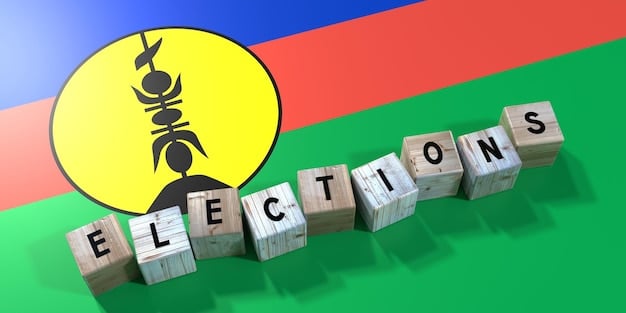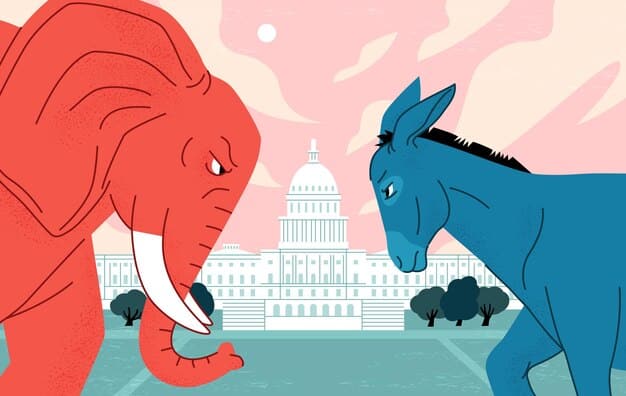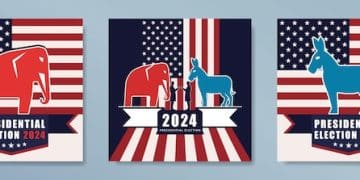Key Economic Policy Differences & 2025 Tax Impact: Democrats vs. Republicans

Key differences in economic policies between the Democratic and Republican parties center on taxation, government spending, and regulation, impacting individual and corporate taxes differently in 2025 depending on which policies are enacted.
Understanding the economic policies of the two major parties is crucial, especially as we look ahead to 2025. This article breaks down the key differences between the two major parties’ economic policies and how they will affect your taxes in 2025, providing you with the information you need to navigate the changing landscape.
Economic Platforms: An Overview of Democratic and Republican Ideologies
The Democratic and Republican parties have distinct economic platforms rooted in different ideologies. Understanding these foundational beliefs is essential for interpreting their policy proposals.
These ideologies influence their approaches to economic issues such as taxation, healthcare, and social safety nets.
Core Economic Principles
The Democratic party generally advocates for a mixed economy with government intervention to address inequality and promote social welfare.
The Republican party typically supports a free market economy with limited government intervention, emphasizing individual responsibility and economic growth through deregulation and lower taxes.
- Democrats often favor progressive taxation, where higher earners pay a larger percentage of their income in taxes, to fund social programs and reduce income inequality.
- Republicans generally advocate for lower taxes across the board, believing it stimulates economic growth by encouraging investment and job creation.
- On government spending, Democrats tend to support robust investment in areas such as education, healthcare, and infrastructure.
- Republicans typically favor reduced government spending and a balanced budget, believing that government intervention can stifle economic innovation.
Ultimately, gaining a clear grasp of the foundational beliefs that underpin the economic platforms of each party is pivotal to interpreting their policy suggestions. These ideologies exert a strong influence on their strategies for dealing with crucial economic matters, including taxation, healthcare, and social safety nets.

Taxation Policies: How Democrats and Republicans Differ
Taxation is a central component of each party’s economic agenda. The Democratic and Republican parties have markedly different approaches to tax policy, reflecting their underlying ideologies.
These differences are particularly impactful for individuals and businesses as tax laws directly affect income and investment decisions.
Individual Income Taxes
Democrats typically advocate for higher taxes on high-income earners to fund government programs and reduce income inequality.
Republicans tend to argue for lower taxes across all income brackets, believing it encourages economic growth.
- Democrats often support raising the top marginal tax rate and increasing taxes on capital gains and dividends for high-income individuals.
- Republicans typically favor reducing income tax rates for all taxpayers, including the wealthy, and often propose eliminating the estate tax.
- The impact of these policies can vary significantly depending on an individual’s income level and sources of income.
Corporate Taxes
Democrats generally support higher corporate tax rates to ensure that corporations pay their fair share and contribute to government revenue.
Republicans typically advocate for lower corporate tax rates to encourage business investment and job creation.
These opposing views shape their approaches to tax reforms and economic stimulus measures.
Government Spending: Priorities and Approaches
Government spending is another area of contrast between the two parties, with different priorities for how tax revenues should be allocated.
Understanding these spending priorities is essential for gauging the potential impact on various sectors of the economy.

Social Programs
Democrats generally support robust funding for social programs such as Social Security, Medicare, and Medicaid to provide a safety net for vulnerable populations.
Republicans typically advocate for reforms to these programs to reduce government spending and promote individual responsibility.
Defense Spending
Republicans generally favor a strong military and advocate for increased defense spending to maintain national security.
Democrats often support a more balanced approach, with investments in both defense and domestic programs.
Ultimately, the allocation of government spending reflects each party’s priorities and values.
- Democrats tend to prioritize investments in education, healthcare, and infrastructure to promote social and economic mobility.
- Republicans often focus on reducing the national debt and believe that spending should be limited to essential government services.
Understanding these spending choices can provide insight into how each party plans to shape the future economy.
Healthcare Policies: Contrasting Visions for Access and Affordability
Healthcare is a critical issue that divides the Democratic and Republican parties, with different ideas about how to ensure access and affordability.
The debate over healthcare policy has significant implications for individuals, families, and the healthcare industry.
The Affordable Care Act (ACA)
Democrats largely support the Affordable Care Act (ACA) and advocate for expanding its coverage and benefits.
Republicans have consistently sought to repeal and replace the ACA with alternative market-based reforms.
Single-Payer Healthcare
Some Democrats advocate for a single-payer healthcare system, also known as “Medicare for All,” where the government would be the primary payer for healthcare services.
Republicans generally oppose a single-payer system, arguing that it would lead to government overreach and reduced quality of care.
Understanding these different visions for healthcare is crucial for assessing the potential impact on access, affordability, and quality of care.
Regulations: Balancing Economic Growth and Consumer Protection
The role of government regulation is another area where the Democratic and Republican parties diverge.
These differences impact various sectors of the economy, including finance, environment, and labor.
Financial Regulations
Democrats generally support stronger financial regulations to prevent reckless behavior and protect consumers.
Republicans often argue for deregulation to promote economic growth and innovation in the financial sector.
Environmental Regulations
Democrats typically advocate for stricter environmental regulations to address climate change and protect natural resources.
Republicans frequently argue that environmental regulations can stifle economic growth and support a more balanced approach.
The debate over regulations reflects different views on the appropriate role of government in the economy.
Impact on Taxes in 2025: Potential Scenarios and Implications
Looking ahead to 2025, the tax landscape could change significantly depending on which party controls the White House and Congress.
Understanding the potential scenarios and their implications is vital for financial planning and investment decisions.
Republican Control
If Republicans control the government, it is likely that they would pursue further tax cuts, particularly for corporations and high-income individuals. This could stimulate economic growth but also increase the national debt.
Democratic Control
If Democrats control the government, they may seek to raise taxes on corporations and high-income earners to fund social programs and reduce income inequality. This could lead to a more equitable distribution of wealth but also potentially dampen economic growth.
Divided Government
If the government is divided, it may be difficult to enact significant tax reforms, resulting in a continuation of the current tax policies.
Given these potential scenarios, individuals and businesses should carefully monitor political developments and consider adjusting their financial strategies accordingly.
| Key Point | Brief Description |
|---|---|
| 💡 Tax Policies | Democrats favor progressive taxes; Republicans prefer lower taxes across the board. |
| 💰 Government Spending | Democrats prioritize social programs; Republicans focus on defense and reduced spending. |
| ⚕️ Healthcare | Democrats support ACA and single-payer options; Republicans seek market-based reforms. |
| ⚖️ Regulations | Democrats favor strong regulations; Republicans prefer deregulation to boost growth. |
Frequently Asked Questions
▼
Progressive taxation is a system where higher-income earners pay a larger percentage of their income in taxes. This is often favored by Democrats to fund social programs and reduce income inequality.
▼
Republicans typically advocate for lower corporate tax rates to encourage business investment and job creation. They believe this stimulates economic growth and benefits the overall economy.
▼
Democrats generally support robust funding for social programs like Social Security, Medicare, and Medicaid. They view these programs as a vital safety net for vulnerable populations.
▼
Republicans have often sought to repeal and replace the Affordable Care Act (ACA) with market-based reforms. They advocate for solutions that increase competition and consumer choice.
▼
Depending on which party controls the government, the tax landscape could shift significantly. Republican control could lead to further tax cuts, while Democratic control may result in increased taxes on corporations and high earners.
Conclusion
Understanding the economic platforms of the Democratic and Republican parties is essential for making informed decisions about your financial future. By considering the potential impacts of their policies on your taxes and the broader economy, you can navigate the changing landscape with greater clarity and confidence.





